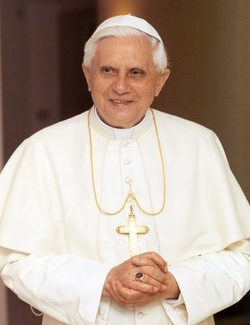
This time tomorrow the Church and the world will have no Pope. At this Mass tomorrow we will not hear the name “Papa Nostro Benedicto” in the canon. And for this we have come to this chapel to offer Mass for our beloved Pontiff during his last 24 hours as our papa.
We give thanks for his service to the Church: as a young priest in the Archdiocese of Munich-Freising, as a professor of theology at various Catholic universities, as a peritus at the Second Vatican Council, as prefect for the Sacred Congregation for the Doctrine of the Faith for 23 years, and of course since 2005 as Vicar of Christ on earth.
A man of hope
Pope Benedict is a man of hope. In his second encyclical, on Hope, he writes that “the distinguishing mark of Christians is the fact that they have a future… the dark door … of the future has been thrown open. … it is not the laws of matter and of evolution that have the final say, but reason, will, love—a Person.” In perhaps his most influential book, Introduction to Christianity, written in 1968 and studied by thousands of seminarians since then, he describes how Hope has overwhelmed death, man’s final despair. A Christian goes to the realm of the dead only to find Someone has been there before him, and is waiting for him. “Christ strode through the gate of our final loneliness; in his passion he went down into the abyss of our abandonment. Where no voice can reach us any longer, there is he.” Benedict does not renounce the papacy in despair, but with great hope in the future.
A man of realism
And yet Joseph Ratzinger is nothing if not a realist. Cardinal Ratzinger offered Mass at the Angelicum while I was a student there. One of my classmates chose not to attend, because he thought Ratzinger was too liberal! But I remember his careful, measured speech, his calm and balanced realism. Cardinal Ratzinger was almost the only Roman prelate not taken in by falsehoods and false expectations within the Church, such as the Legionaries of Christ affair. He perceived, perhaps more than any prelate, the parts of the Church whose scandals have now become public. There is certainly more to come, and Pope Benedict is under no illusion that one Pope can clean out these Augean stables. “After having repeatedly examined my conscience before God,” he said three weeks ago, “I have come to the certainty that my strengths, due to an advanced age, are no longer suited to an adequate exercise of the Petrine ministry. I am well aware that this ministry, due to its essential spiritual nature, must be carried out not only with words and deeds, but no less with prayer and suffering.”
Benedict knows, more than perhaps any man in the Church today, that the “Son of man will be handed over, mocked, scourged, and crucified.” He remembers that Christ’s own apostles, James and even the Beloved Apostle John, were compromised by ambition: “Let us sit, one at your right and one at your left, when you come into your kingdom.” But man of hope that he is, he knows that these two apostles will drink the chalice of sacrifice. They will learn to love as Christ loves. His first and greatest encyclical quotes that very Apostle John, Deus Caritas Est. “It is in contemplating the pierced side of Christ that our definition of love must begin,” he writes.
And so our beloved Pontiff goes into seclusion within 24 hours, to contemplate the pierced side of Christ, his open heart, pouring blood and water over his Bride, the Church, that she may be presented to his Father without spot or stain.
Let us pray for this man, old and worn out, seemingly beaten by his enemies, who renounces the papacy within a few hours. He does so in great hope, as he said upon announcing his resignation. “There are times when the burden of need and our own limitations might tempt us to become discouraged,” he wrote in Deus Caritas est. But then God’s love “frees us from the presumption of thinking that we alone are personally responsible for building a better world.” “And now,” he wrote in his resignation statement, “let us entrust the holy church to the care of our supreme pastor, Our Lord Jesus Christ, and implore his holy Mother Mary, so that she may assist the cardinal fathers with her maternal solicitude, in electing a new supreme pontiff.”


 RSS Feed
RSS Feed